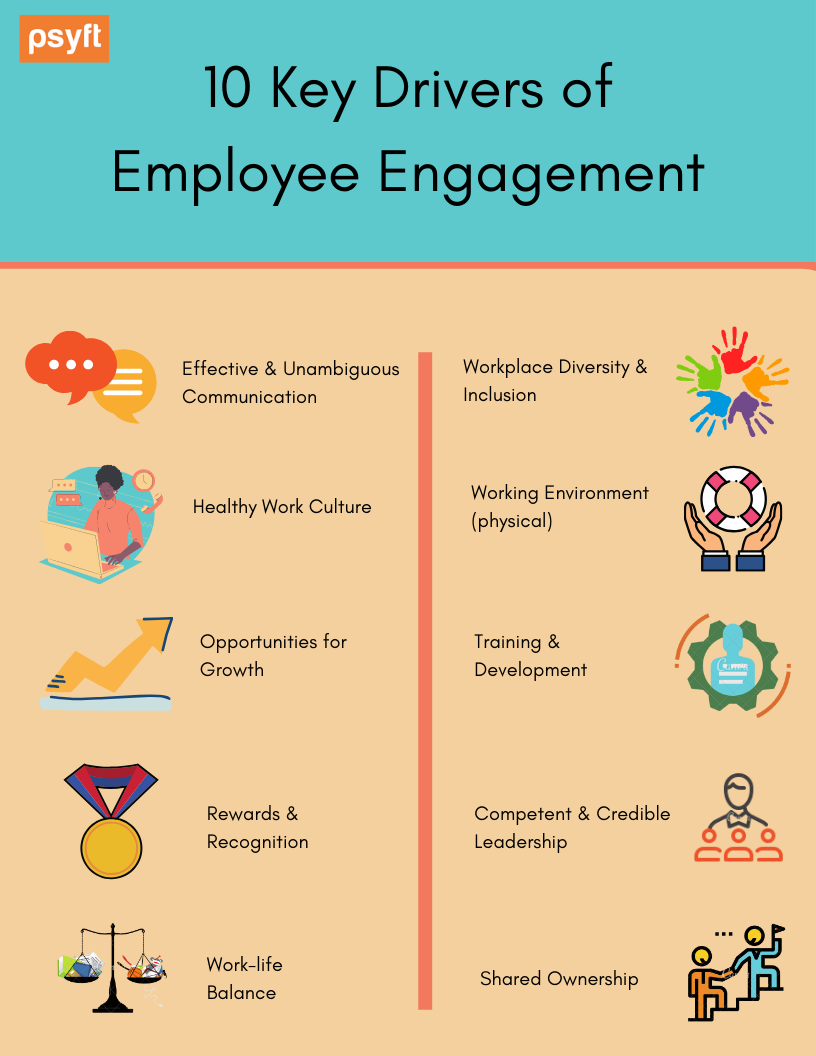Blogs
Get latest insights on what's trending in the HR world - Talent Search, Talent Assessments, Psychometrics, Employee Engagement, Appraisals & much more.

Best Employee Engagement Survey Questions to Extract Actionable Insights
21st July 2022
Motivated workforce equals organizational success. A great way to measure employee satisfaction is through employee engagement surveys. Although these days most companies conduct employee surveys in some form to understand how they feel regarding the different variables in their work environment, the question remains - Are they doing it right? Are they asking the right questions?
It must be understood that an employee engagement survey is not an end in itself. Just doing a survey will not fix any of your employees’ issues. The survey is a tool that helps an employer understand what they are doing right and where they need to course correct. A well built survey questionnaire helps you understand exactly this. A team of professional experts not only helps your managers design an engagement survey from a well-curated database but also debrief them about implementation, feedback and action-planning strategies.
This article provides a comprehensive list of questions that give you insights into your organization’s connection with your workforce. The list has been divided into three parts:
Problems With Employee Engagement Survey
-
Employee centric:
Covering areas like employee engagement index and self-efficacy, compatibility with peers and manager and feedback about them future orientation and satisfaction questions.
-
Employee Net-Promoter Score (eNPS):
A metric that assesses employees' job satisfaction by measuring their readiness to recommend their company to others. Apple was a pioneer of this metric.
-
Organization centric:
These questions mainly deal with organizational policies and social values, alignment between individual and organizational goals and feedback regarding changes (if any) required.
Employee engagement centric
- How do you feel about your work today?
- Do you feel motivated to come to work each morning?
- Do you feel positive and motivational vibes while at work?
- Do you feel empowered at your workplace? Why or why not?
- Are your projects stimulating enough to work beyond what is required? Why or why not?
- Are you fully equipped to handle your work? If not, what resources do you lack?
- Do you feel comfortable sharing ideas and giving opinions at your workplace?
- Do you feel comfortable asking for help if you do not have the requisite skill set to complete your task?
- Are you comfortable in taking informed risk and appreciated for taking initiative?
- How comfortable are you working with your team and sharing responsibility?
- How do you feel about the support system provided at work by your peers and superiors?
- How prominent is the office politics at your workplace?
- Is your contribution to work and your efforts recognized by your peers and the leadership?
- Are you rewarded for your accomplishments at work?
- What do you think of compensation and benefits your company provides?
- Are you able to form close relationships at work? Why or Why not?
- Does your manager care about you as a person?
- Do you feel like your supervisor is invested in your personal success?
- Do you see a path for your career advancement in your organization?
- How often does your manager provide you with feedback about your work?
- Does your manager set realistic deadlines?
- Do you need to take your work home?
- Do you feel pressured to work the weekends?
- Do you feel you don’t have leisure time to spend with family and friends?
- Does your manager suggest opportunities for your personal growth in the company?
- Does your manager actively participate in your goal setting and action plan?
- Do you feel that the feedback from your peers, team and supervisor has helped you in your career goals?
- Does senior management show concern and lend support during any health crisis?
- Are you clear about your company’s wellness policies?
- How does your company foster your physical and mental well-being?
- Does your company provide basic amenities to make you feel comfortable and relaxed?
eNPS
- How likely are you to recommend the company as a place to work for your family and friends?
Organization centric
- Can you describe your organization in three words?
- Why did you answer the above question the way you did?
- Do you understand the organizational goals and objectives?
- Do you feel aligned to the organizational goals and objectives?
- Do you feel that the leadership shows genuine interest in your individual goals? Why or Why not?
- Does your organization take social responsibility seriously?
- Does your organization foster a diverse and inclusive environment?
- Do your organization’s vision and goals inspire you?
- Does your organization provide you with adequate resources to maximize your potential?
- Do you feel pressurized to comply with certain organizational policies?
- Does the management invest itself in your cultural and social initiatives?
- Is the leadership team transparent in its dealings with employees?
- Have you recently thought about leaving the organization?
- If your answer is yes to the above question, list your reasons.
- What practices if adopted by your organization can bring about a positive change at work?
- How invested are you in the future of your company?
- Do you see yourself as a long term employee in your company?
- How likely are you to recommend your organization to your friends and acquaintances?
Few important things to keep in mind while picking questions for an employee engagement survey:
- The questionnaire should cover a wide range of questions, give a holistic view and the respondents understand exactly what is being asked and why.
- Questions should be presented in a relaxed, systematic and planned manner.
- An environment of trust should be created through the survey.
- A feeling of ‘empathy’ or ‘putting yourself in their shoes’ must be conveyed while picking the questions so employees feel assured while answering it.
Using the questions suggested above will help any company gather valuable data regarding their employees’ engagement levels. To make the most of this data, the organization must quickly move to create action plans - both at team and organizational levels. This will demonstrate the organization's keenness on improving their employees’ experience and goes a long way in raising engagement levels in the long-term.
Recent Articles
- When Everyone Wants WFH - Tips To Manage An Expanding Team Of Remote Employees
- 5 Proven Strategies To Retain Your Best Talent In 2022
- Why Organizations Should Take Exit Surveys Seriously
- How To Create A Culture Of Recognition In The Workplace
- Why Manager Effectiveness Survey Is Important For A Workplace
News Center
- India Today - 7 reasons companies ask for psychometric tests
- Business World - AI - The New Secret Sauce in Psychometric Assessments
- DNA - HR Trends for 2018
- The Hindu - Psychometric Assessment a "game changer" in hiring
- Entrepreneur - 9 ways to promote actionable feedback at organisations
- Human Capital - Looking Beyond Performance Appraisals





